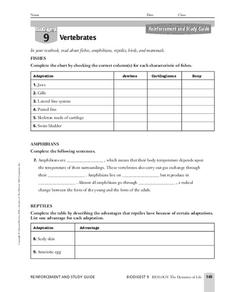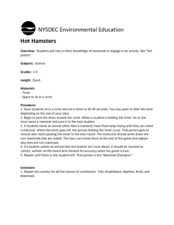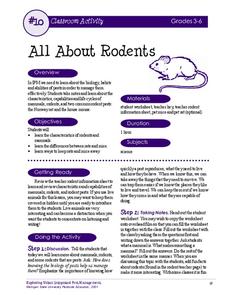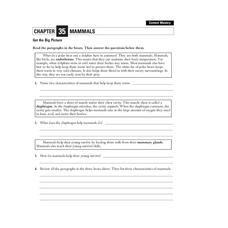Curated OER
Vertebrates
In this vertebrate learning exercise, students review the different adaptations for the 5 groups of vertebrates: birds, mammals, reptiles, amphibians, and fishes. This learning exercise has 12 matching, 1 fill in the blank, and 7 short...
Curated OER
Classification of Intertidal Organisma
Students categorize animals. For this animal classification lesson, students group animals by their characteristics. Students break into groups and work together to classify the animals. Students fill out a graphic organizer with their...
Curated OER
Hot Hamsters
Using this quick activity, you can have your class review what they have learned about mammals. Learners sit in a circle, and take turns naming a mammal. This activity could be enriched by having learners go to their desks, identify a...
Curated OER
Phylum Chordata
All major groups of vertebrates are summarized here with the characteristics of each explained. Other subphyla of chordates are listed: cephalochordata, urochordata, monotremata, marsupialia. The details are relevant but are not linked...
Curated OER
Mammals, Mammals--Everywhere!
Students explore the habitats of mammals and their physical characteristics. They research examples of mammals that must deal with daily changes in their habitat and how they cope with them. In small groups, students create a table...
Michigan State University
All About Rodents
Get to the know the common house mouse and the Norway rat with an activity that reinforces reading comprehension skills. Scholars read a three-page document detailing key information about mammals, specifically rodents, and use their...
Curated OER
Mammal Morphology - Bats, People, and Other
For this physical characteristics worksheet, students compare bats and humans by putting a + sign in the chart for whether or not bats and humans have the same characteristics. Students do this for 17 characteristics and answer 3 questions.
Curated OER
"Whales are Mammals" Idea Web
Third graders explore the characteristics of whales that defines them as mammals. Using the internet and Inspiration software, 3rd graders create and organize "idea bubbles" to organize facts about whales. They locate details to...
Curated OER
Animal Classes-Mammal Birds Fish Reptiles Amphibian
Students learn about the characteristics of each animal classification. In this animal classification lesson students will first learn the characteristics of each classification. Then, they will find animals from given materials and...
Curated OER
Animal Analogies
Worksheet is to helpful as grammar is to fun! Work on solving 18 analogies involving animals and their characteristics with an engaging grammar assignment.
Larson Lab
Animal Classification
How are animals classified? Scholars explore animal classification by observing non-living and living specimens. They learn how to organize animals into vertebrates and invertebrates and identify the five vertebrate groups: mammals,...
Twisty Noodle
Fur, Features, Scales, and Shells Book
What's the difference between a bear and a fish? Examine the characteristics of different animals with a set of pages for kids to color. Four pages provide different animals for each characteristic, including turtles, bears, fish, and...
National Wildlife Federation
Tricky Tracks
While wildlife may not always be visible, they leave their marks behind for people to discover. A wildlife lesson has pupils explore the characteristics of animal tracks. They learn different types of tracks, as well as what tracks tell...
Curated OER
Know Your Cousins - Monotremas, Marsupials, and Placentals
Students discover various mammals. For this biology lesson plan, students recognize characteristics of mammals and categorize mammal groupings. Students describe how mammals grow inside the mother's body and resemble their parents at...
Curated OER
Baleen Whales vs. Toothed Whales
Second graders review mammal characteristics and study two types of whales. In this mammal study lesson, 2nd graders discuss mammals and define their five characteristics. Students complete a whale worksheet and define differences...
Curated OER
Animals
Second graders define and describe the characteristics of a mammal and a mammal's importance to man. They also describe the life cycle of a frog and compare and contrast a larva and an adult frog. Finally, 2nd graders study and explain...
Curated OER
Animals A to Z: Manatee
In this manatee worksheet, 3rd graders will read 10 facts about a manatee to gain an understanding of the animal's characteristics. Students will locate 10 errors of punctuation, capitalization, spelling, and grammar.
Curated OER
We're Batty
Young scholars watch a video about bats and compare and contrast them to birds. They identify the specific characteristics that identify bats as mammals and what makes them unique from other mammals.
Curated OER
Classification of Animals
First graders investigate the characteristics of vertebrates. They classify each as mammal, fish, bird, and reptiles. Students explore the differences between various types of animals and classify each.
Curated OER
The Amazon Rain Forest
Fifth graders perform a play about the Amazon Rain Forest. They practice assigned parts and sing a song about the Rain Forest. They create costumes for the characters and discuss the role each character plays. They perform the play...
Curated OER
Animals Around the World
Students study different kinds of animals and what group they belong to. In this animal classification activity students view different animals and sort them by what group they belong to, for example a snake is in the reptile...
Curated OER
Mammal Morphology: bats and people
In this mammals activity, students compare and contrast the physical characteristics of bats and people by filling out a chart. Students complete 17 rows in the chart and answer 3 short answer questions.
Curated OER
Mammals
In this mammals worksheet, students read about 3 mammal characteristics: endotherm, diaphragm, and mammary glands. Students use this information to complete 4 short answer questions.
Curated OER
Creatures of the Grand Canyon
In this word search puzzle worksheet, students find and circle all of the wildlife hidden in a word search puzzle. Students also classify the animals into groups of mammals, birds, fish, reptiles, or amphibians.

























